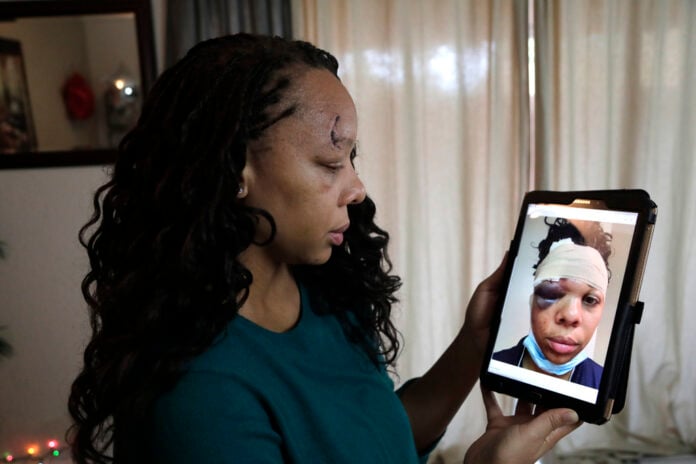
FORT LAUDERDALE, Fla. (AP) — A protester who suffered eye damage when a rubber bullet fired by Fort Lauderdale police struck her in the face during a 2020 protest over George Floyd’s murder has received $2 million from the city to settle a federal lawsuit accusing the officer and the department of violating her civil rights, her attorneys announced.
LaToya Ratlieff, 38, was injured on May 31, 2020, when Detective Eliezer Ramos fired the rubber bullet into a Black Lives Matter protest, one of several that erupted in the country over Floyd’s videotaped slaying six days earlier by a Minneapolis police officer who knelt on his neck for at least nine minutes.
A bystander’s video shows Ratlieff was struck as she choked on tear gas that had been fired by officers and stumbled into a street. She suffered a broken right eye socket, nerve damage to that eye and a 20-stitch gash to her forehead that left a scar. She also suffers from migraines and mental trauma.
“There were moments when, both mentally and physically, I was ready to give up. But I tried to focus on the fact that this was important, not just for me, but for everyone who seeks to use their voice to create meaningful change,” Ratlieff said in a statement issued Wednesday. “While the financial settlement is important for the City to know that it cannot sweep these injustices under the rug, the corrective requirements will make sure that what happened to me must never happen to anyone else.”
The city said in a statement that it “remains committed to ensuring public safety and fostering trust” and that the settlement was “the best financial decision” because taking the case to trial risked additional costs.
“This decision allows us to move forward, focusing on the significant reforms already implemented in police practices, including changes to leadership, training and engagement protocols,” the statement says.
The round that struck Ratlieff was made of collapsible, hollow foam that is typically filled with a chemical irritant. According to its manufacturer, it is about the size of a golf ball, weighs slightly less and has an initial velocity of 200 mph (320 kph). The rounds are supposed to be aimed at the legs and buttocks as they can be lethal if they hit the head or chest.
A police department investigation cleared Ramos of wrongdoing, saying he was aiming at a man who had thrown a tear gas canister back at officers when Ratlieff walked into his line of fire. The department’s then-interim chief also issued an apology to Ratlieff.
The police investigation put the blame for the violence on some of the protesters, saying they had come to the city looking to start a confrontation with officers. Some bottles and rocks were thrown at officers — but Ratlieff’s attorneys say that only began after an officer pushed a kneeling woman to the ground.
A federal class-action lawsuit against the city and police department by others injured at the protest is awaiting trial.


